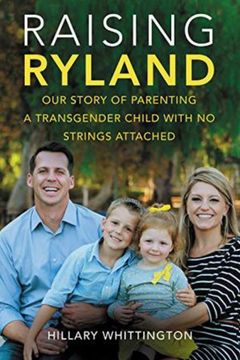
Raising Ryland is the tender story of the Whittington family's four-year journey to teach their deaf child to speak, only to discover that what Ryland had wanted to communicate the most was that he was a boy. Whittington's narrative takes us on a roller-coaster journey as they learn what they thought was a tomboy phase is far from it. Phases, Whittington learns, have a starting and ending point. Gender identity, over time, grows much more substantial.

Hillary and Jeff Whittington struggle to understand what this means for their child, allowing Ryland to dress how he feels comfortable at home but still denying the truth unfolding in front of them. So, Ryland begins to push back in the only ways she knows how. The problem is her parents can't quite figure out what their child needs the most.
"I had been in denial once before with Ryland's deafness. It cost us months of setback and potential limits for Ryland's hearing success, and once we got through the worst of it, I promised myself I would never make that mistake again. I'm paying attention to the signs this time… it's just that I don't know what the signs and all of her struggle mean." (p.81)
Because Ryland picks up on the adults' discomfort around him when his parents begin to ask questions about his gender preferences, he responds in the way he thinks will make them happy. This only compounds the problem further. They believe they have a daughter who is a tomboy. Ryland knows he is a boy fighting to fit into a world where he doesn't seem to belong.
When Ryland is five, the Wittington's learn from a support hotline about transgender kids and get information about therapists in their area for both Ryland and themselves. They learn about support groups in their area and begin the journey of acceptance. Not all transgender children's parents are supportive, and we witness Jeff's transformation from denial to ally. It takes hearing the stories of other parents for Jeff to get on board, but afterward, he is all in.
"Those stories were heartbreaking. I get the consequences we're facing if we don't address more of what's going on. I don't ever want to see Ryland go through those struggles. I'm on the same page now, Hill. I get it." (p.135).
Jeff becomes Ryland's most prominent advocate, fighting the school to become more gender-inclusive. He also leaves his longtime job with the San Diego Fire Department to better support his family. Hillary creates a video to be shown at a school training. And Ryland prepares to start kindergarten, which gains the family's story public recognition locally and nationally.
At 253 pages and nineteen chapters, Raising Ryland is a book that will tug at your heart as well as your sense of admiration for a family trying to support their child the best way they can. Ryland's video is available to view on YouTube. The Whittington's story has also become a short film in conjunction with CNN films.
*As an Amazon Associate, I earn a commission from qualifying purchases you make with the links I share. It doesn’t cost you more, but I want you to know that.
Subscribe to get my latest content by email, and I'll send you SIX questions to ask yourself before sharing that your child is transgender: because it can be a little overwhelming and sometimes you just need to know where to start.
We hate SPAM. We will never sell your information, for any reason.

